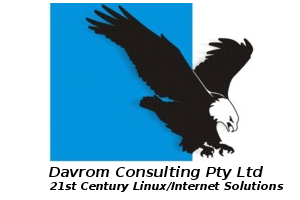





Back to Newsletters DAVROM CONSULTING Newsletter - Issue # 14 - Dated: Mon Oct 21 15:22:45 EST 2002 From the desk of David Clark At this time of year in this part of the world days start to get hotter and hotter and it's amazing the amount of heat generated by four small computers in our office. Time to make sure those internal fans are running well and the blades are turning freely. Support has been a mixed bag for us these last few weeks and naturally we still have had to help sites with backup issues (or the absence there-of). We also recently sold and implemented an IBM xSeries Server 220 running OpenServer 5.0.6 for one of our customers. In this newsletter we have included a "links" section that is below the Tech Tip section which provides some quick HTML links into our website. Our thanks to those customers who have come onboard with our "Heartbeat" solution. For more information please go to: http://www.davrom.com/products/heartbeat.html Stay cool this summer. I would like to thank the reader for their time in reading this newsletter. David.M.Clark Surge Protection and UPS As a follow on to the editorial; with the hot weather in this part of the world brings with it those nasty thunderstorms that cause power loss to areas and more dangerously cause your hardware to be susceptible to power surges owing to power fluctuations. To protect your hardware a small investment in a surge protected power board at your local computer or hardware store is a must. The base brand surge protectors offer a once only surge protection which may save your PC/Server from critical damage to its internal hardware. The more expensive brands of surge protectors can be reset to continue safeguarding your hardware. A UPS will have power surge protection built into it (some older brands may not) as it also monitors power continuance to the attached devices. The added advantage of having a UPS provides you with the automated shutdown software protection which will shutdown the server "gracefully" in the event of a mains power outage or allow you to get onto the console and perform this task manually. There are some great UPS products we have installed that grant you this type of functionality. If you suspect you have power issues it is advisable that you either contract your local "sparky" to come and check the power outlets for you or you could purchase a spike/power monitoring device to check out your local and computer room power outlets. I have seen electricity do some weird and wonderful things to hardware over the years so make sure you have this area well protected. Some recent news bits --> Cactus Software: 1.Rescue-Ranger Disaster Recovery for SCO OpenServer 5 now includes bootable CD Crash Recovery part to its backup/restore and allows remote recovery via a network. 2. Rescue-Ranger v02.00.03 - Linux Disaster Recovery now has added support for SuSe 8.0 and RedHat v8.0 and includes bootable CD/DVD-RAM crash recovery and recovery from a remote backup device 3. LTX v1.0 Lone-Tar now has a GUI interface for SCO OpenServer, Linux, UnixWare, FreeBSD and Open Unix. --> SCO and Mandrakesoft Achieve LSB Certification Caldera OpenLinux from SCO and Mandrake Linux ProSuite meet the stringent requirements of Linux Standard Base (LSB) Certification --> RedHat have released RedHat 8.0 which has a new GUI interface. Tech Tip Inspired by an enquiry today by one of our major customers, the following command line allows you to backup shared folders (or parts thereof) of a Windows PC to the local tape drive on a UNIX server: /usr/local/samba/bin/smbtar -v -s rosie -x cdrive -d docs -t /dev/rStp0 "smbtar" is the backup command, "-v" give you maximum verbosity, "-s rosie" is the PCs name, the "-x cdrive" is the MS share name, the "-d docs" is the name of a directory under the "cdrive" share (if you want the whole share folder of "cdrive" you won't use the "-d docs" option), the "-t /dev/rStp0" is the name of the tape drive device on the UNIX server. This creates a tar tape that can be restored back to the PC using smbtar with the "-r" option or can be restored directly to the UNIX server's directory structure (eg., cd /tmp; tar -xvf /dev/rStp0). Back to Newsletters 





Website design by Davrom Consulting Pty Ltd This site is fully tested with Google Chrome and Firefox web bowsers Home Page | Support | Misc | David's Pages | Podcasts | Contact Us | Blog |
